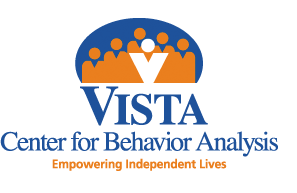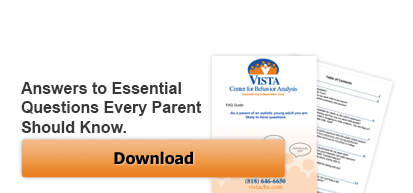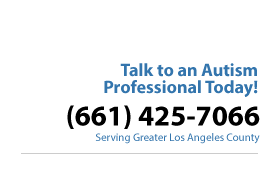Skills for Independent Living Program
Adults with Autism (18+)Is your adult child with autism ready to take care of himself?
A common fear for parents with an adult child with autism or other developmental disability is that their child will become more and more isolated once they no longer have the routine of going to school. The result of this isolation is a growing feeling of hopelessness for both the adult child and the parents. We understand these fears and our program is designed to address your adult child’s maturing needs. The goal of our program is to increase your adult child’s capabilities in areas that are critical to their next stage of life. Our comprehensive and customizable programs are designed to:
- Engage your young adult child in the development of life skills
- Enable his or her integration into society
- Enrich his or her life with confidence and a sense of independence
Adults with Autism Program: “Skills for Independent Living“
Three Modules
Vista supports adult clients in our “Skills for Independent Living” program. These skills training areas have been developed as three separate modules, which can be implemented separately or all together. The decision as to which modules to implement depends on the individualized assessed needs of each client. Through our experience, interviews with families who are caring for adults with disabilities, and a review of the scientific literature, Vista has identified the following three clusters of skills or modules that are critical for promoting independence and fulfilling lives:
- Living Skills
- Social Integration Skills
- Vocational Skills
Module #1 – Living Skills In Vista’s Living Skills module, clients learn and apply activities of daily living that enhance their ability to manage their own self-care and live independently. Skills learned in the Living Skills Module include:
- Food preparation
- Cleaning and household chore
- Laundry
- Grocery and household product shopping
- Personal hygiene and grooming
- Home and community safety awareness
- Budgeting and banking
- Paying bills
- Usage of public transportation
- Usage of public restrooms
- Personal health care
- Medication management
- Shopping
- Making doctor appointments
- Self-advocacy
Module #2: Social Integration Skills In Vista’s Social Integration Skills module, clients learn and apply skills that provide for quality-of-life enhancement. A focus on the client’s areas of interest will be the starting point in developing a plan. As a result, the client will learn how to participate more fully in relationships. Skills learned in the Social Integration Skills module include:
- Fitness awareness
- Interactive conversations
- Tolerating frustration and exhibiting calming strategies
- Decision-making skills
- Making appropriate choices
- Using appropriate social etiquette and table manners
- Interpreting social cues
- Initiating and maintaining personal relationships
- Dealing with dating and sexuality
- Participating in social, recreational, and leisure activities
- Time management
Module #3: Vocational Skills: In Vista’s Vocational Skills module, clients learn and apply the essential skills necessary for entering into the workforce, finding appropriate employment, and maintaining that employment. Skills learned in the Vocational Skills module include:
- Developing a resume
- Searching for employment
- Completing job applications
- Developing interview skills
- Learning to select professional attire
- Learning to make a positive presentation
- Demonstrating appropriate work behaviors
- Collaborating and interacting with co-workers
- Managing job stress
Our Proven 5 Step Process for Training Independent Living Skills to Adults with Autism
Step 1: Comprehensive Assessment: a master’s level Case Manager (CM) will evaluate your child’s skills, resources, supports and objectives, then produce a written report outlining the recommended services and plan for delivery of those services. Step 2: Service Delivery: your child will receive one-to-one services from a trained Behavior Interventionist (BI), who train the skills as outlined in the Initial Assessment; the BI reports to a CM, regarding the data collected on your child’s skill development. Step 3: Periodic Reporting: the CM will create quarterly Progress Reports regarding your child’s development, which will serve as a barometer for the success of the program. Step 4: Graduation: your child will graduate from the program when he or she has achieved the goals set forth in the Initial Assessment and in Progress Reports. Step 5: Post-Graduation: your child may return to the program if he or she requires follow-up support or if he or she has developed new needs which need to be addressed in an updated program.


